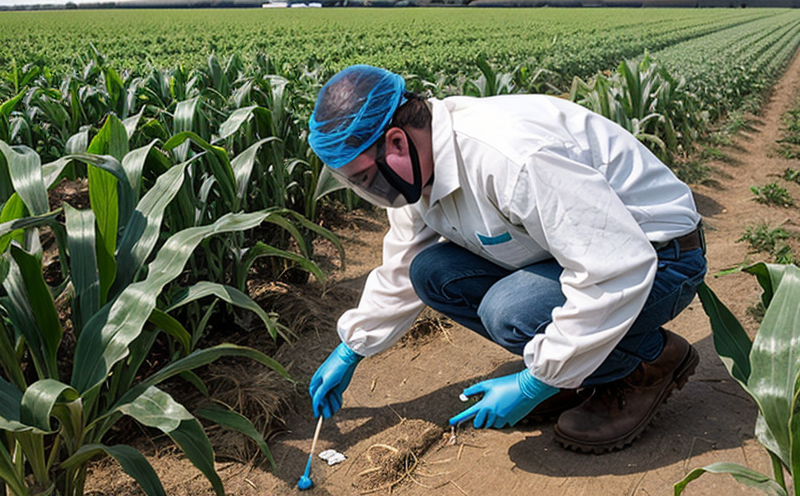Triazole Fungicide Residue Testing
Triazole fungicides are a critical component of modern agricultural practices designed to manage fungal diseases effectively. However, excessive or inappropriate use can lead to the presence of residues in crops, which may pose risks to human health and the environment. Consequently, rigorous pesticide residue testing is essential for ensuring compliance with regulatory standards and maintaining product safety.
The triazole fungicides family includes several active ingredients such as tebuconazole, fluazinam, and tetraconazole. These compounds are known for their broad-spectrum activity against various fungal pathogens in agricultural crops like cereals, fruits, vegetables, and ornamentals. Despite their benefits, the potential presence of these residues necessitates accurate and reliable testing methods to ensure they do not exceed permissible limits.
Our laboratory uses advanced analytical techniques including Liquid Chromatography-Mass Spectrometry (LC-MS) to detect and quantify triazole fungicide residues in crops. This approach provides high sensitivity and specificity, enabling precise measurement even at very low concentrations. The testing process involves several key steps:
- Crop sample collection
- Sample preparation (homogenization and extraction)
- Liquid Chromatography-Mass Spectrometry analysis
- Data interpretation and reporting
The precision of this method ensures that even trace amounts of triazole residues are detected, which is crucial for maintaining product safety. Regulatory compliance standards such as ISO 14050 and ASTM E1253-19 are strictly adhered to in our testing protocols.
The importance of this service extends beyond ensuring compliance with regulatory standards. It also plays a vital role in protecting the reputation of agricultural producers, enhancing consumer trust, and supporting sustainable farming practices. By accurately measuring triazole residues, we contribute to safer food production, thereby fostering long-term economic benefits for all stakeholders involved.
| Use Case | Description |
|---|---|
| Farmers and Growers | To ensure adherence to local and international regulations regarding maximum residue limits (MRLs) of triazole fungicides in their produce. |
| Pharmaceutical Companies | To verify the safety profile of crops used as raw materials for pharmaceutical products, ensuring they meet stringent quality control standards. |
| Agricultural Research Institutions | To conduct research on the efficacy and safety profiles of triazole fungicides under different environmental conditions. |
| Government Regulatory Bodies | To enforce compliance with pesticide residue limits set by national or international regulations. |
Why It Matters
The presence of triazole fungicide residues in crops can have significant implications for both human health and the environment. Excessive exposure to these compounds has been linked to various health issues, including respiratory problems and immune system disorders. Moreover, the accumulation of residues in the soil over time can lead to ecological imbalances, affecting non-target organisms.
From a regulatory perspective, strict limits on pesticide residues are imposed to safeguard public health and environmental integrity. Non-compliance with these regulations not only risks legal penalties but also undermines consumer confidence and market access for agricultural products. Therefore, accurate and reliable testing of triazole residues is indispensable in maintaining compliance and ensuring product safety.
Our laboratory plays a pivotal role in this process by providing precise and detailed test results that help stakeholders make informed decisions. By adhering to international standards such as ISO 14050 and ASTM E1253-19, we ensure the highest level of accuracy and reliability in our testing methodologies.
Customer Impact and Satisfaction
The impact of accurate triazole fungicide residue testing on customers is profound. For farmers and growers, it ensures that their produce meets stringent quality control standards, thereby enhancing marketability and maintaining a positive reputation. For pharmaceutical companies, it guarantees the safety and efficacy of their products derived from agricultural raw materials.
Government regulatory bodies benefit from our services by having reliable data to enforce compliance with pesticide residue limits set by national or international regulations. This not only helps in protecting public health but also ensures that agricultural practices remain sustainable over time.
The satisfaction of our customers is reflected in their trust and loyalty, which is built on the reliability and accuracy of our testing services. By providing precise and detailed test results, we enable stakeholders to make informed decisions that align with regulatory requirements and promote best practices in agriculture.





